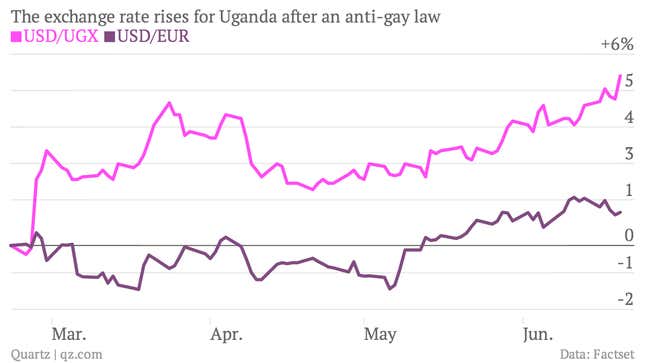
Since passing laws mandating the life in prison for “homosexual acts” in February, Uganda has seen its currency weaken considerably, with US dollars now costing nearly 6% more since the day the law was signed. (In the same period, the euro has weakened against the dollar by less than 1%.)
It’s not that markets are moral. The latest sell-off comes after the United States announced Friday that it would cancel aid programs and military exercises with Uganda; other Western countries are doing the same, including Norway, Denmark and Sweden. Threats to enact responses like these helped kill an earlier version of Uganda’s anti-gay bill that included the death penalty for some violations, but the country’s president, Yoweri Museveni, went ahead with the new version anyhow.
Foreign aid makes up about 4% of Uganda’s gross national income, and is equal to more than a third of government revenues. If its volume continues to decrease significantly, that’s going to be noticeable—already, local traders are predicting dollar shortages.
But though a weaker currency will make life harder for Ugandans who rely on imported goods and increase prices throughout the economy, it’s not clear that it will put much of a dent in the country’s growth, which comes from the exploitation of natural resources such as metals and oil. That wealth is likely to be concentrated in a few hands, and aid cuts probably won’t affect them much. So Western countries are in a bind: They are obliged to respond to human rights abuses, yet their punishments, by disproportionately hurting ordinary Ugandans, could leave those who imposed the offensive laws in an even more powerful position.




